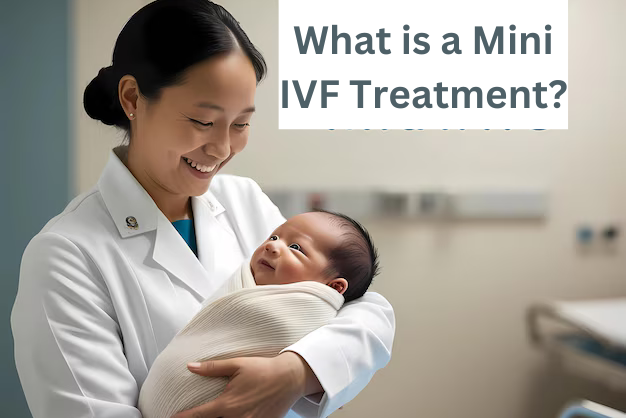What is a Mini IVF Treatment?
Mini IVF, also known as Minimal Stimulation IVF, is a type of In Vitro Fertilization (IVF) that uses a lower dose of fertility medications compared to traditional IVF. This results in a milder stimulation process with fewer side effects, making it a suitable option for some women.
How does Mini IVF work?
The Mini IVF process involves the following steps:
1. Ovarian stimulation: You will receive a lower dose of fertility medications to stimulate your ovaries to produce fewer eggs than traditional IVF. This reduces the risk of overstimulation syndrome, a serious condition that can occur with higher doses of medication.
2. Egg retrieval: Once your eggs are mature, they will be retrieved through a minimally invasive procedure.
3. Fertilization: The retrieved eggs will be fertilized with sperm in a laboratory setting.
4. Embryo transfer: One or more embryos will be transferred to your uterus with the hope that they will implant and develop into a pregnancy.
Who is a good candidate for Mini IVF?
Mini IVF may be a good option for you if you:
- Have a history of mild ovarian hyperstimulation syndrome (OHSS)
- Have a low egg reserve
- Are over the age of 35
- Prefer a less invasive and less expensive IVF treatment
What are the advantages of Mini IVF?
Lower risk of OHSS: Due to the lower dose of fertility medications, Mini IVF carries a lower risk of OHSS.
Milder stimulation: Mini IVF is generally a less invasive and less uncomfortable process than traditional IVF.
Lower cost: Mini IVF may be less expensive than traditional IVF due to the lower use of fertility medications.
What are the disadvantages of Mini IVF?
Lower pregnancy rates: Mini IVF may have lower pregnancy rates than traditional IVF due to the smaller number of eggs retrieved.
Not suitable for all women: Mini IVF may not be suitable for women with certain medical conditions or those with a very low egg reserve.
Success rates of Mini IVF
The success rates of Mini IVF vary depending on several factors, including the age of the woman, the quality of the eggs and sperm, and the number of embryos transferred. However, studies have shown that Mini IVF can have comparable pregnancy rates to traditional IVF in some cases.
Is Mini IVF Right for You?
Mini IVF is an excellent option for women looking for a more natural, less invasive fertility treatment. However, it may not be suitable for everyone. A thorough consultation with a fertility specialist at New World Fertility Centre in Delhi can help determine if Mini IVF is the best choice for your individual circumstances. Our expert team will provide personalized care, guiding you through every step of the process.
We offer a wide range of fertility services, including:
- IVF
- IUI
- Egg freezing
- Sperm freezing
- Altruistic Surrogacy
We also have state-of-the-art facilities and the latest technology to help you achieve your dream of having a baby.
Conclusion
Mini IVF is a promising fertility treatment option for some women. If you are considering Mini IVF, it is important to discuss your options with a fertility specialist to determine if it is the right choice for you.
The New World Fertility Centre in Delhi is committed to helping you achieve your dream of having a baby. Contact us today to schedule a consultation.
FAQs
1. What is Mini IVF?
Mini IVF, or Minimal Stimulation IVF, is a fertility treatment that uses lower doses of fertility medication to stimulate the ovaries to produce fewer but higher-quality eggs. It is a gentler, less invasive alternative to traditional IVF.
2. How does Mini IVF differ from conventional IVF?
The primary difference is in the level of hormonal stimulation. Mini IVF uses a lower dose of fertility drugs, whereas conventional IVF uses higher doses to produce a greater number of eggs. Mini IVF typically retrieves fewer eggs but aims for better quality, with reduced medication and costs.
3. Who is a good candidate for Mini IVF?
Mini IVF is suitable for:
- Women with diminished ovarian reserve
- Those at risk of ovarian hyperstimulation syndrome (OHSS)
- Patients looking for a more natural or less invasive fertility treatment
- Couples seeking a more affordable IVF option
4. What are the steps involved in Mini IVF?
The steps include:
- Ovarian stimulation with low-dose fertility medication
- Monitoring of follicle development
- Egg retrieval
- Fertilization of eggs in the lab
- Embryo transfer to the uterus
- Pregnancy test two weeks after transfer
5. What are the benefits of Mini IVF?
- Reduced use of fertility drugs
- Lower risk of OHSS
- More affordable than traditional IVF
- A more natural process that focuses on egg quality over quantity
- Fewer side effects from medication

 Jul-23-2025
Jul-23-2025